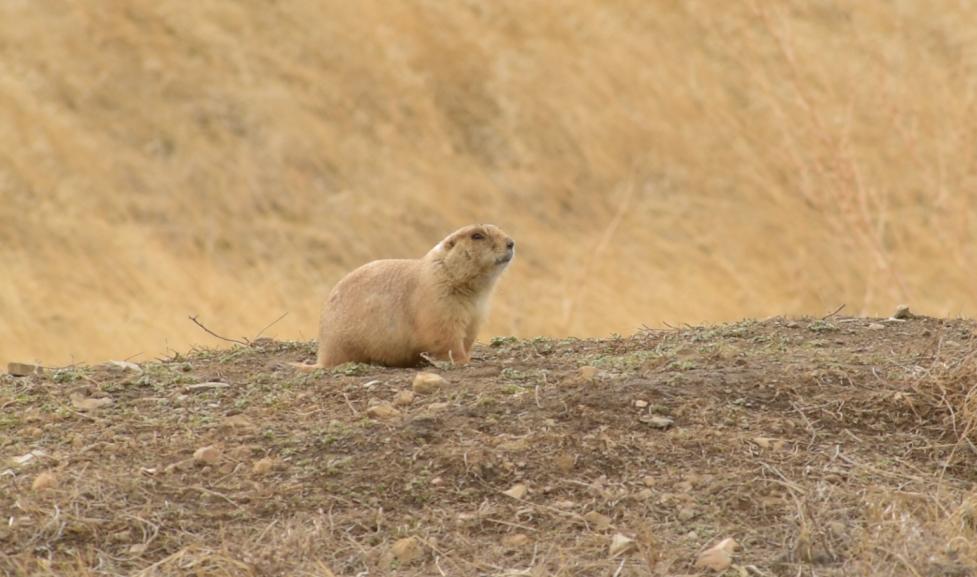City of Boulder plans and policies strive to strike a balance between protecting and maintaining healthy prairie dog populations and safeguarding natural communities and other land uses that conflict with prairie dog occupation.
City conservation and management of prairie dogs is also guided by Prairie Dog Working Group recommendations and a recent review of agriculture and prairie dog management, soil health and land restoration efforts on irrigated city open space lands. Read more about how City of Boulder manages and conserves prairie dogs.
Plague Management Plan
The city has developed a natural area sylvatic plague management plan. The scope of this plan is natural areas management where prairie dogs exist, and the purpose is to describe why plague management occurs on City of Boulder property and where, when, and how plague management will be implemented to support the city’s multiple goals for grassland habitats.
Grassland Ecosystem Management Plan
The Grassland Ecosystem Management Plan PDF was accepted by City Council in 2010. It provides a framework to conserve prairie dogs and associated species as a part of the grassland ecosystem by establishing goals and objectives to measure success in prairie dog conservation and management. It also defines criteria to guide relocation of prairie dogs to, from, and within the OSMP system, and defines land management designations for every prairie dog colony mapped.
Expedited Review of Prairie Dogs in Irrigated Fields
In 2019 and 2020, OSMP reviewed agriculture and prairie dog management, soil health and land restoration efforts on irrigated city open space lands. On Tuesday, Sept. 1, 2020, the Boulder City Council accepted Open Space Board of Trustees (OSBT) recommendations and provided direction for the management of OSMP irrigated agricultural fields occupied by prairie dogs, which include the following actions:
- Meet with stakeholders, including neighboring property owners.
- Relocate prairie dogs from 30 to 40 acres of irrigated agricultural lands annually.
- Apply for a special permit for lethal control on irrigated agricultural lands.
- Remove approximately 100-200 acres via lethal control annually.
- Allow agricultural activities that may damage prairie dog burrows.
- Restore soils and vegetation for irrigated agricultural use and carbon sequestration.
- Establish a 100% removal goal within irrigated agricultural fields.
- Install barriers where appropriate.
- Work with tenants and neighbors to coordinate removals.
- Allow relocation of up to 20 individual prairie dogs from urban sites.
Prairie Dog Working Group
A city Prairie Dog Working Group (PDWG) – made up of 12 community members representing a variety of viewpoints – reviewed the city's prairie dog management policies and practices and made recommendations for changes to existing policies and new initiatives to help manage prairie dog colonies and habitats. Their work continues to help guide ongoing prairie dog management practices on open space.
Open Space and Mountain Parks Master Plan
The Open Space and Mountain Parks (OSMP) Master Plan PDF, accepted and adopted by the Boulder City Council in September 2019, has a Tier 1 strategy related to the management of agricultural lands occupied by prairie dogs. Tier 1 Master Plan strategies are those that the department will focus on first while scaling all other work to align with available funding. The strategy seeks to address conflicts between agriculture and prairie dogs while supporting ecologically sustainable prairie dog populations across the larger landscape.
Agricultural Resources Management Plan
The OSMP Agricultural Resources Management Plan PDF, accepted by the City Council in 2017, seeks to decrease impacts to agricultural production from prairie dog occupation and to evaluate options to manage prairie dogs and agricultural conflicts better. Strategies available for implementation within the existing policy framework include:
- Re-applying the prairie dog colony management area designation criteria to agricultural lands to help evaluate and prioritize properties for removal.
- Identifying a process for rapid response restoration and recolonization prevention of agricultural properties when prairie dogs are removed, die off or are reduced in spatial extent.
- Exploring changes to grazing regimes, vegetation restoration and non-native vegetation management techniques to encourage the faster recovery of vegetation in potential relocation sites.
Wildlife Protection Ordinance
This ordinance prohibits anyone from using lethal control measures for prairie dogs without first having obtained a lethal-control permit from the city. For a permit to be issued, the landowner must satisfactorily demonstrate that all non-lethal options for managing prairie dogs on a site were considered and were found not feasible. This municipal code applies to the city itself and all city lands even if they are owned in county jurisdiction. The ordinance also protects prairie dog burrows from damage.
Urban Wildlife Management Plan
Wildlife in the Boulder city limits and along the urban interface sometimes conflict with human activities. This situation creates the need for a comprehensive, long-term plan to guide management of wildlife in Boulder's urban areas. The Boulder community, City Council, Environmental Advisory Board, and Parks and Recreation Advisory Board worked together to develop an Urban Wildlife Management Plan (UWMP) to help address concerns about bears, bobcats, coyotes, prairie dogs, mountain lions and other wildlife issues.
The purpose of the UWMP is to establish a set of policies and guidelines for managing wildlife within Boulder. The intent of the plan is to integrate urban wildlife management in the Boulder Valley with the existing and emerging plans and policies of the Open Space and Mountain Parks (OSMP) Department.
The UWMP establishes a framework for making urban wildlife management decisions, provides direction on regulatory and program changes, and outlines a set of actions for long-term management of human-wildlife conflicts.
